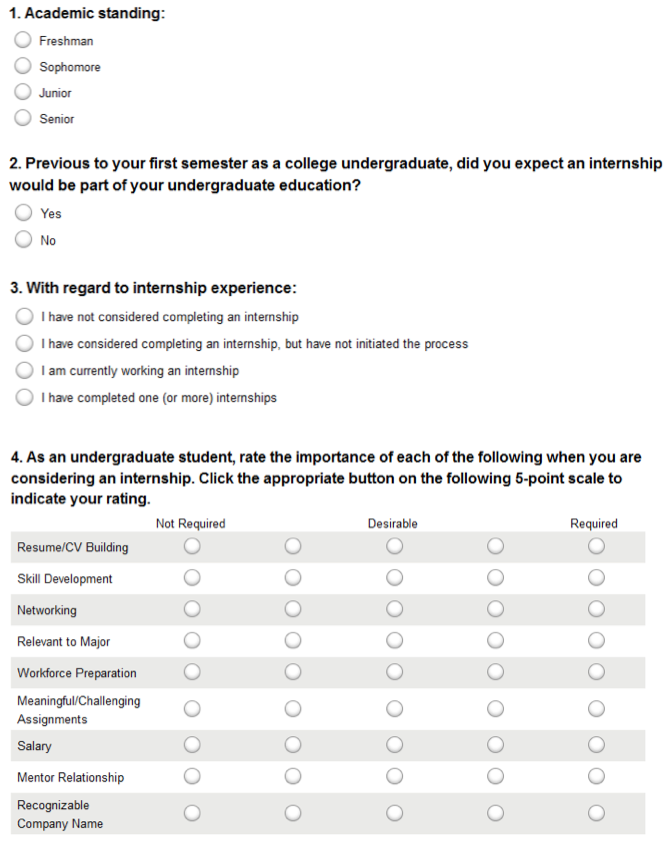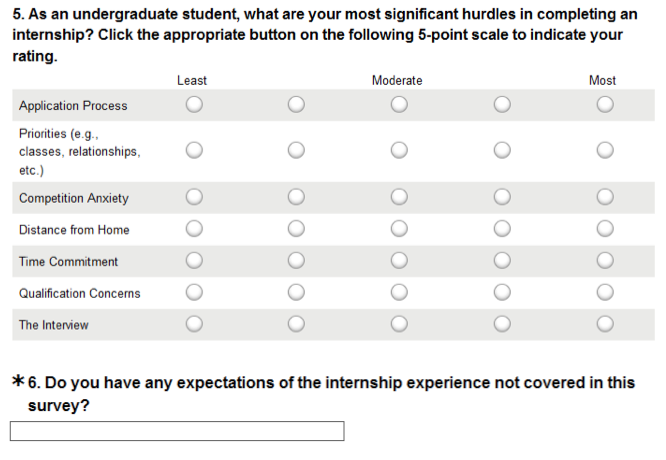Undergraduate Internship Expectations: Strategic Encouragement of Student Involvement
By
2013, Vol. 5 No. 12 | pg. 1/2 | »
IN THIS ARTICLE
KEYWORDS
AbstractInternships supply undergraduates with work experience, networking potential, and opportunities to apply classroom content to career-oriented professions (D’Abate et al., 2009). Participation in an effective internship program benefits the undergraduate student, internship host, and community by professionally preparing undergraduates through mentored relationships. The current study examines undergraduate internship expectations with the goal of using our findings to encourage internship involvement. The Undergraduate Internship Expectations (UIE) survey was developed to collect self-report data via: (1) written response to the UIE survey from 100 undergraduates, and (2) focus groups during which 19 undergraduates discussed and elaborated on UIE survey questions. Survey results show that prior to beginning college, 50% of respondents thought that an internship would be part of their undergraduate career. However only about one in five respondents were currently participating in, or had already completed, an internship. After starting college, approximately 63% of respondents indicated they had considered an internship, but not initiated the process. A chi-square revealed this group was larger in proportion than any other (p < .001). UIE survey and focus group results indicate increased undergraduate internship participation would result from development of an internship program tailored to their expectations of benefits (e.g., skill development, workforce preparation, etc.) and priorities (e.g., relation to major, networking, etc.). Now more than ever undergraduates need to be educated, prepared for the workforce, and have skills relevant to their chosen field of work. These qualifications show employers that undergraduates are valuable to them and merit the employer’s training and wages (Zupek, 2011). Undergraduates need to be involved in internships to reach these goals, as classroom learning often does not suffice to prepare undergraduates for employment (American Accounting Association, 1952). A review of popular literature shows undergraduates who complete an internship bring more to the classroom experience to supplement content, including through greater self-awareness by having greater exposure to the habits of the professional world (Westerberg & Wickersham, 2011). Beyond the classroom, internships allow undergraduates a hybrid form of education and skill development by working in a real world environment while still receiving the mentorship they need to grow in their chosen field.Selected Literature on the Impact and Importance of Student InternshipsFreestone, Williams, Thompson, and Kerry (2007) showed internships promote undergraduate employment prospects by providing the opportunity for them to apply their knowledge and skills in a real world setting. Freestone et al. (2007) administered their Course Experience Questionnaire (CEQ) to undergraduates in a one-year degree program offered in Australia. The CEQ was designed to assess goals, tasks, and skills associated with internships as well as examine their role in supporting undergraduate learning. CEQ results indicated undergraduates felt satisfaction with internship work placement when they received support from their internship host, and when they felt their academic and internship advisors were consistently supportive (Freestone et al., 2007). Research done by Freestone et al. (2007) supports the possibility that positive and more numerous internship experiences are facilitated not only by the internship itself, but also by the input undergraduates have on their internship program. Green, Graybeal, and Madison (2011) suggest internships benefit undergraduates because they help them identify key traits for entering the professional world. Green et al. (2011) surveyed business school undergraduates to better understand the effects participating in an internship had on the value they placed on employer desired traits. Respondents were surveyed before and after involvement in an internship. Survey results showed undergraduates and employers had different ideas about what was important during an interview (Green et al., 2011). Before starting an internship, undergraduates tended to place less importance on traits employers found valuable, but, post internship, undergraduates had become more aware of the traits employers value (Green et al., 2011). This finding shows internships prepare undergraduates for the working world by aligning undergraduate (potential employee) and employer expectations and priorities with the subsequent effect of making internship trained undergraduates a more desirable choice for employers. A survey conducted by the National Association of Colleges and Employers (NACE) found that nearly 60% of interns turned their internship into a full time job (2011). This is clear evidence that internships greatly impact one’s chance of finding employment in their academic field after college. According to The Washington Center (TWC), even if an undergraduate is not offered a position when their internship is complete, the networking opportunities they were exposed to while in their internship position are invaluable (TWC, 2011). Many undergraduates are offered positions immediately following graduation because of the connections they made while networking as an intern (TWC, 2011). Additionally, participating in an internship provides benefits not only to the undergraduate, but the employer as well. A significant challenge for employers is finding employees who possess adequate skills (Billitteri, 2009). Billitteri (2009) summarized previous research indicating that, of 200 surveyed employers, almost half revealed they provided training to the college graduates they hired. This suggests, now more than ever, undergraduates need internships. If more undergraduates participated in internships, they would be more professionally prepared to enter the workforce and companies like those surveyed could minimize new hire training and focus on other priorities. There is nevertheless a lack of research on the topic of undergraduate internship interest and involvement (D’Abate, Youndt, & Wenzel, 2009). The current study explores undergraduate expectations (i.e., motivations and hurdles) for the internship process. To address this goal, we surveyed undergraduates at a small liberal arts college about their expectations and perceptions of the internship process. MethodologyThe purpose of the current study is to further clarify undergraduate expectations of the internship experience. To do this, we conducted focus groups and survey research. Study 1Materials. Respondents were asked to complete the Undergraduate Internship Expectations (UIE) survey (see Appendix A) on their personal computer or smartphone. We designed the UIE survey to include six questions related to student expectations of the internship experience and designed to avoid priming particular responses. Questions and responses came in one of three formats: (1) multiple-choice with provided options, (2) ratings requested based on a five-point Likert scale with provided beginning, mid, and end points (1, 3, 5) and (3) open ended responses. Respondents. 100 undergraduates were selected to complete the UIE Survey via convenience sampling at a small liberal arts college. These undergraduates were compensated for their time with course participation. Each undergraduate was provided the option to participate or complete an alternative task related directly to course demands. Demographic information collected was restricted to class standing and showed our sample included first through fourth year students. All survey responses were kept confidential and no identifying information was collected. Procedure. The UIE survey was administered in a classroom setting. Respondents were instructed to keep conversation to a minimum so as to maintain the integrity of individual results. The researcher provided respondents a brief summary of the informed consent document and purpose of the study. After signed, informed consent documents were collected, and respondents completed the UIE survey via Survey Monkey using their personal laptops or Smartphones. Survey Monkey was used as a secure storehouse for the confidential information obtained, for presentation of survey questions, and as a data summary tool. After completion of the UIE survey, all respondents were thanked for their time. As respondents were aware of the study’s aims, no debriefing session took place. Study 2Materials. The UIE survey was used as a source for questions specifically relating to undergraduate expectations of the internship process. A recording device (iPhone 4s Voice Memos) was used to maintain authenticity for transcription. Respondents. A focus group including 19 undergraduates was formed to further discuss and analyze questions from the UIE survey and form ideas about how to encourage undergraduate involvement. The focus group was composed of third and fourth year undergraduates. Respondents represented various segments of the internship participation population ranging from those who had never completed an internship to those who had completed several. Respondents were recruited as volunteers and asked to convene in the group for one hour; they were provided course credit and refreshments for their participation. Procedure. The focus group session was held in a college classroom and audio recorded to maintain authenticity in conversation and response transcription. The questions posed in the focus group were sourced from the UIE survey, but allowed respondents greater opportunity for elaboration, discussion, and reflection. Responses collected via the focus groups were coded into categories present on the UIE survey and extending beyond. Survey and Focus Group ResultsStudy 1UIE Survey data were stored in Survey Monkey and responses to each question were analyzed using the appropriate method, given question type. For questions assessing general trends (UIE questions 1, 2, 4, &5), descriptive statistics were used to summarize undergraduate responses. UIE question 3 compared stages of internship completion (e.g., considered but not initiated, already completed, etc.), thus, inferential statistics were used to allow comparisons between those who had completed internships and those who had not. Respondents were asked if they thought, previous to beginning college, an internship would be a part of their undergraduate career (UIE question 2). Of our 100 survey respondents, 50.0% indicated they expected an internship would be part of their undergraduate career. Respondents were then asked if they had ever: considered but not initiated, initiated, completed an internship or never considered an internship (UIE question 3). Of the100 respondents, 63.3% indicated they had considered participating in an internship, but had not yet initiated the process. 17.3% of respondents indicated they had not considered participating in an internship, 9.2% were currently working in an internship, and 10.2% had already completed one or more internships (see Figure 1). Figure 1: Results of UIE survey question three which assessed internship experience.
FIA chi-square shows a significant difference (p < .001) among student internship experiences (UIE question 3). Grouping responses to UIE questions 2 and 3, data reveal 19.4% of our sample were or had been engaged in internships. The difference between the 50.0% of our sample who indicated they expected an internship to be part of their college career and the 19.4% who indicated they were or had been involved in an internship produced a 30.6% internship involvement gap (Huddy, Frederick, Burns, Aitkenhead, 2013). UIE question 4 assessed undergraduate motivation for participating in an internship with, ranked by average score on a 5-point Likert scale, the top motivators being (1) skill development, (2) relevance to major, (3) workforce preparation, and (4) networking (see Figure 2). Figure 2: Results of UIE survey question four which assessed the importance of each aspect (noted in graph) when considering an intership.
Respondents were, then, asked about hurdles to internship completion (UIE question 5). As identified by survey respondents, the top four hurdles undergraduates face, ranked by average score on a 5-point Likert scale, are (1) competing priorities, (2) time commitment, (3) qualification concerns, and the (4) application process (see Figure 3). Figure 3: Results of UIE Survey question five which assessed significant hurdles to completing an intership. Suggested Reading from Inquiries Journal
Inquiries Journal provides undergraduate and graduate students around the world a platform for the wide dissemination of academic work over a range of core disciplines. Representing the work of students from hundreds of institutions around the globe, Inquiries Journal's large database of academic articles is completely free. Learn more | Blog | Submit Latest in Education |

















